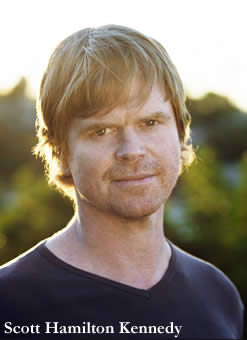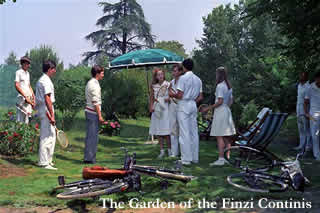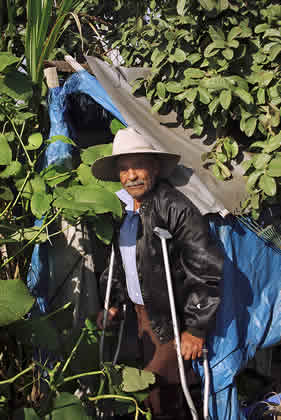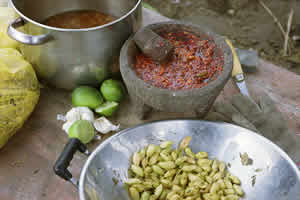The fourteen-acre community garden at 41st and Alameda in South Central Los Angeles is the largest of its kind in the United States. Started as a form of healing after the devastating L.A. riots in 1992, the South Central Farmers have since created a miracle in one of the country’s most blighted neighborhoods. Growing their own food, feeding their families and creating a community. But now, bulldozers are poised to level their 14-acre oasis.
The Garden follows the plight of the farmers, from the tilled soil of this urban farm to the polished marble of City Hall. Mostly immigrants from Latin America, from countries where they feared for their lives if they were to speak out, we watch them organize, fight back, and demand answers: Why was the land sold to a wealthy developer for millions less than fair-market value? Why was the transaction done in a closed-door session of the LA City Council? Why has it never been made public? And the powers-that-be have the same response: “The garden is wonderful, but there is nothing more we can do.” If everyone told you nothing more could be done, would you give up?
Scott Hamilton Kennedy’s debut documentary, OT: our town, was an official selection and won awards at some of the top film festivals in the world. In its theatrical release, OT garnered rave reviews and was selected for several ‘best of’ lists (including Kenneth Turan of the L.A. Times). OT was also honored by being ‘short listed’ for an Oscar nomination and was nominated for Best Documentary at the Independent Spirit Awards. Scott started his career in music videos, making several number-one internationally aired videos including Jimmy Cliff’s remake of “I Can See Clearly Now.” As a director, Scott has worked with Showtime, CBS, AMC, Roger Corman, and Mattel.
Scott is developing his narrative feature script Up River, an urban adventure movie set on the L.A. River, which went through the IFP/FIND Directors Lab. He is also in postproduction on a reality series entitled Fame High, a show about the L.A. County High
School for the Arts (LACHSA) which follows freshman and seniors through a school year as they try to become successful actors, singers, dancers, and musicians.
Bijan Tehrani: How did you first encounter this subject?
Scott Hamilton Kennedy: It was through my co-producer, Dominic Derringer, who saw a PBS piece, on the show Life and Times, about the garden. We had been looking to do a project together, and he said, ‘I think we’ve found something here’, and he was absolutely right. It had so many elements of a great story. He sent me a transcript, and even with that you could see so many elements. I was on a plane and got off in LA, and went right to the garden, and we started shooting the next day. So I guess you could say that there was no pre-production on this film.
BT: How long were you shooting with these people? How long did the film take to finish?
SHK: It was a long process. It took from that first day on February 18th 2004, to our world premiere at Silver Docs last summer, June 2008. So almost four and a half years. Main production was February 2004 to mid-Summer 2006, but then there were lots of extra pickups when we were editing. I edited in fits and starts as money and time were available.
 BT: How challenging was this film to make?
BT: How challenging was this film to make?
SHK: There were many challenges. Documentaries are challenging and complicated, and verité documentaries have their own complications in staying on top of all the characters, having the energy to stay on top of everything and not missing any important beats, and knowing what beats you want to capture, because you want to get specific. The editing process it is just as daunting, to look through over 300 hours of footage and try to figure out what needs to stay and what can go, and how it all comes together in a cohesive and, God-forbid, entertaining way.
BT: What kind of relationship did you establish with the people working in the garden?
SHK: I got extremely close with Rufina and Tezzo, and several of the others. We spent a lot of time together over the course of two and a half years. I don’t know if I would call them my best friends; I wouldn’t be so pretentious as to call them family. But I see them at the farmers markets, and we stay in touch at screenings, and I go to their meetings as much as I can. We are all very proud of the response that people have had to the film, and that has brought us even closer.
BT: What was your expectation when this film began? Were you surprised with the way the film turned out?
SHK: Absolutely. There were many surprises along the way. When I first came into the story I had a lot of compassion and love of the situation, the garden. That love then grew to include a great passion for the people that made this happen. But at first I was fascinated and moved by the fact that this garden even came into existence, let alone grew into an incredible success over twelve years. It is a beautiful example for me of these United States and this system of democracy–something that we Americans like to hold as being something that we are extremely fond–working. The local  government and local community came together and took a difficult situation like the riots and built something great to heal that situation. Sadly, in the end the local government and local community didn’t agree on how this should continue, and the local government, I think, failed these people in terms of honesty and follow through. In terms of the outcome of the film, no, I didn’t know this was going to be the outcome. But in the simplest terms, there were really only two possible outcomes; either the garden was or was not going to survive. I never gave up believing that these farmers were going to figure out a way to save this place. So I didn’t know the outcome, but I just tried to keep up on the ride and capture it as best as I could.
government and local community came together and took a difficult situation like the riots and built something great to heal that situation. Sadly, in the end the local government and local community didn’t agree on how this should continue, and the local government, I think, failed these people in terms of honesty and follow through. In terms of the outcome of the film, no, I didn’t know this was going to be the outcome. But in the simplest terms, there were really only two possible outcomes; either the garden was or was not going to survive. I never gave up believing that these farmers were going to figure out a way to save this place. So I didn’t know the outcome, but I just tried to keep up on the ride and capture it as best as I could.
BT: As I was watching the film, I really wanted to see an interview with the owner. What was your relationship with him, and what was the reason that we did not see him at the end of the film?
SHK: I asked Mr. Horowitz several times to be interviewed, and he declined and declined. I spoke with him on the phone several times, and I spoke with him in the courthouse, and he said ‘When it is over, and not a legal issue, we can talk’. He then actually won the overturning of the injunction and he still wouldn’t talk to me, and then the land was demolished and he still wouldn’t talk to me. So, that’s all I can say about that; I tried and definitely wanted to talk to him. The final quote that you are talking about, during the demolition, is him speaking on the local news. You can actually hear his TV in the background if you listen closely, he is watching the demolition live on T.V.
BT: Have the workers seen the finished filmed?
SHK: I can’t tell you that everyone of the single farmers have seen the film, but we have had several screenings here in LA, and distribution of the DVD to the farmers. Our first big screening was at the LA Film Festival , and there were about 350 people there, and I’d say 75 to 100 of them were farmers or farm supporters. The response was amazing and emotional; lots of cheering and booing, and a great deal of pride that their story was captured in all the complexities. They were really happy that they were represented and that this will be a piece of history that they can show their children and grandchildren. And that they can teach them about what happened and the movement around it, and that you can get your voice heard. Even if this didn’t work out as perfectly as the farmers had hoped, it doesn’t mean that democracy isn’t worth fighting for.
BT: I think this is a very important film because it brings this subject out into the open. How do you see this film helping the cause in the future for these farmers?
SHK: It is still a little early to tell, because the film has not reached the audience that I hope it will in terms of DVD and educational purposes. I would not want to overstate the effect that it will have, but I know that it is getting out there and getting the people of LA to question their city government. I think that is a good thing; even with Mr. Obama, who I am very excited about; I think we can’t elect him and expect him to do it all on his own. We  need to be here to fine tune his administration and carry some water. I think and hope that the film gets the message across to people that we need to be involved and can’t just rely on the local government to do right by us, and we need to make good ideas like the garden come to fruition. I hope this film is used in many ways. The farmers have been using it, and many educational groups and universities are requesting the film for educational purposes. That has been very inspiring, especially to see the variety of departments that have requested it, from Latino Studies to Environmental Studies, and Landscape Architecture to Urban Planning.
need to be here to fine tune his administration and carry some water. I think and hope that the film gets the message across to people that we need to be involved and can’t just rely on the local government to do right by us, and we need to make good ideas like the garden come to fruition. I hope this film is used in many ways. The farmers have been using it, and many educational groups and universities are requesting the film for educational purposes. That has been very inspiring, especially to see the variety of departments that have requested it, from Latino Studies to Environmental Studies, and Landscape Architecture to Urban Planning.
BT: Any future projects in the works?
SHK: I am working on my third LA documentary, called “Fame High”. It is a year of following freshman and seniors at a performing arts high school as they try to become actors, singers, dancers. I am in post-production, and hope to have it out in the next eight months to a year.

